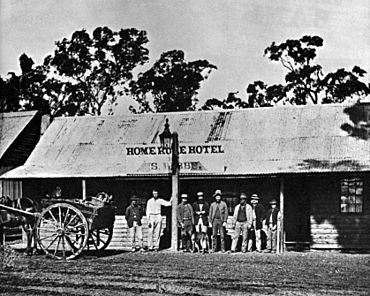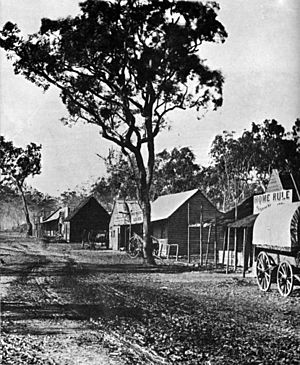Home Rule, New South Wales facts for kids
Quick facts for kids Home RuleNew South Wales |
|
|---|---|

Home Rule Hotel, c.1872. From the Holtermann Collection
|
|
| Postcode(s) | 2850 |
| Location | |
Home Rule is a small area in the Central West region of New South Wales, Australia. It was once a busy village during the 1800s gold rush. Today, not much is left of that old gold mining village.
Contents
The History of Home Rule's Gold Rush
The land where Home Rule is located today traditionally belongs to the Wiradjuri people.
Gold Discovery and Early Days
Gold was first found nearby in Gulgong in 1870. Prospectors, or gold seekers, then moved to Canadian Lead in 1871. Finally, in May 1872, they discovered gold at Home Rule. This gold was found in "deep lead deposits." These are ancient riverbeds buried deep underground.
Home Rule quickly became a lively gold mining village. On July 9, 1872, a newspaper called The Maitland Mercury reported on the busy scene. It said that a new town was growing fast, right near the gold mines. People were very hopeful about finding riches. Shop owners and pub owners were happy, expecting to make a lot of money. Even the Chinese miners were smiling!
Life in the Gold Village
Just after gold was found, the village of Home Rule grew very quickly. It had about 3,000 people living there. On July 15, 1872, a photographer named Charles Bayliss took many pictures of the village. He photographed businesses, their owners, staff, and customers. These photos were taken using glass plates. They are now part of the famous Holtermann Collection. This collection shows what life was like during the gold rush.
Around 1904, there was a new interest in deep lead mining in the area.
The Home Rule School
Home Rule also had a public school for many years. It opened in November 1874. The school's name changed a few times. It was called Mobellah for a while, then Wyaldra. But in December 1913, it went back to being called Home Rule. The school finally closed in December 1957.
What's Left of the Old Village?
Today, only a few things remind us of the old mining village. Some modern roads still use the names of the old streets. These include Commercial Street, Stanley Street, and Britannia Road. The part of Commercial Street that goes from east to west was the main street of the old village. Britannia Road, which runs north to south, was where the original school building stood. That old school building is still there today.
There is also a mining pit filled with water. It is located to the east of the end of Commercial Street.



